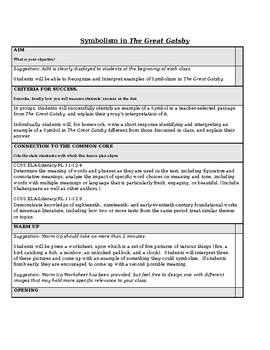
“Gatsby's ability to reinvent himself comes from his belief in the American dream: He embraces the economic opportunities afforded to him by a nation based on a free-enterprise system.

Therefore, they believe in success, even if it is through immoral or illegal means (Eble). East Egg also represents eastern America, symbolizing the transition of wealth and power from the western frontier to the city …show more content… Gatsby embodies what West Egg stands for: “new money.” The typical inhabitant of West Egg does not come from a rich background, but they have made a name for themselves by accumulating wealth. As a result, West Eggers often look down on others for not having as much money and causes separation between people like Daisy and Gatsby for no other reason than Gatsby not being raised in the same lavish environment. People of lower statuses can never achieve the prestige of those who live in East Egg because they lack the required social breeding (Verderame “Social Class”). “They had spent a year in France for no particular reason, and then drifted here and there unrestfully wherever people played polo and were rich together” (Fitzgerald 6). Their reluctance to attend Gatsby’s “heathenous” parties and strong dislike of East Egg’s occupants reveal this faulty view. Fitzgerald creates the illusion that those who live in East Egg are the height of society and live the ideal life (Eble). Symbolism in the settings of East and West Eggs in The Great Gatsby reflects the theme of social …show more content… It is home to people such as Tom and Daisy Buchanan who represent “old money,” which has been in their families for generations. He adeptly uses setting as a symbol expressing themes and issues of his day.

It is not hard to see the resemblances between the book and what was actually happening during Fitzgerald’s day. His writing genius helps make The Great Gatsby what is considered to be the greatest American novel of all time. This is the first description Fitzgerald offers his readers of his novel’s two main settings.

“Twenty miles from the city a pair of enormous eggs, identical in contour and separated only by a courtesy bay, jut out into the most domesticated body of salt water in the Western hemisphere, the great wet barnyard of Long Island Sound” (Fitzgerald 4-5).


 0 kommentar(er)
0 kommentar(er)
